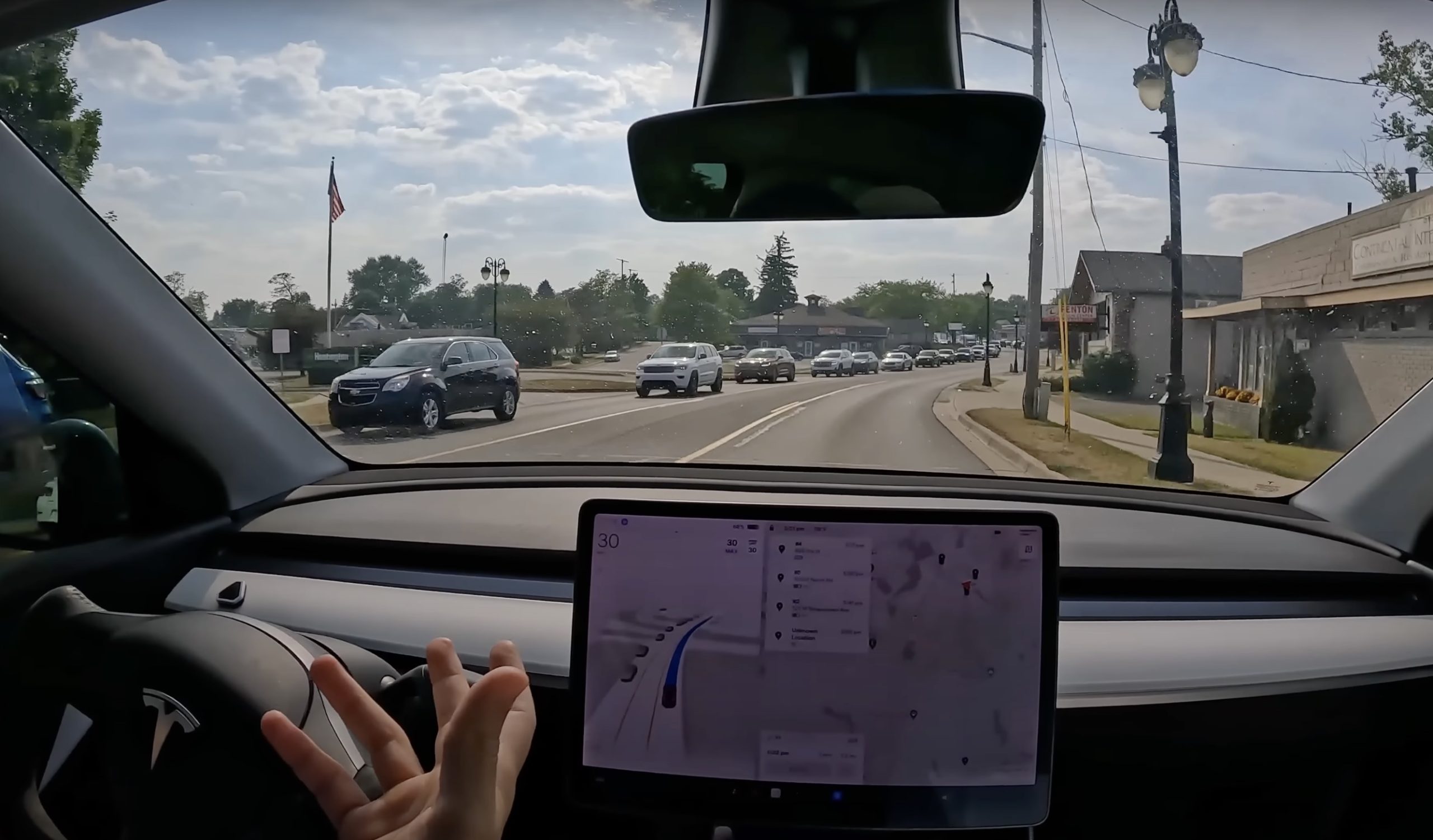
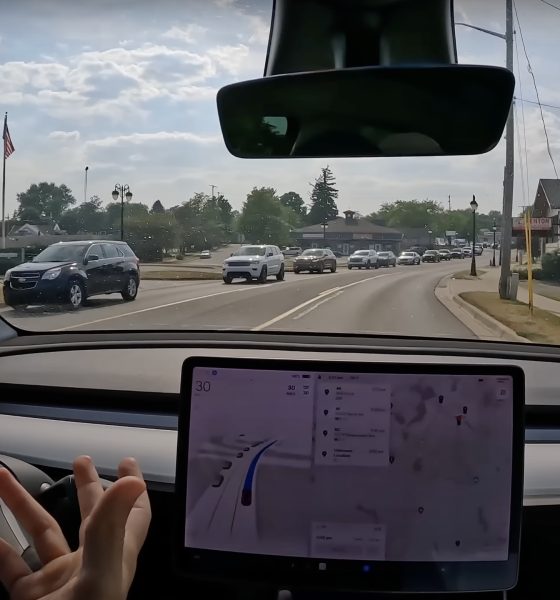
News
Elon Musk says next FSD version to let drivers wear sunglasses
Tesla’s next version of Full Self-Driving (FSD) has been widely discussed in recent weeks, and a new update from CEO Elon Musk over the weekend highlights the fact that it won’t prevent drivers from wearing sunglasses anymore.
The FSD Supervised system uses a driver monitoring feature that makes sure drivers remain attentive and awake, though the system won’t allow the driver to wear sunglasses with the system engaged without nags. In response to one X user complaining about not being able to wear sunglasses while using FSD on Saturday, Musk wrote that the issue would be fixed in v12.5, to which many users in the thread expressed appreciation.
Should be fixed in 12.5
— Elon Musk (@elonmusk) July 21, 2024
Tesla FSD v12.4.1 with no nag starts rolling out to select customers
It’s still not clear exactly when Tesla plans to start deploying FSD Supervised v12.5.
Musk originally said that FSD v12.5 would be out in late June, and many are especially waiting for the update as it’s expected to finally bring FSD Supervised to the Cybertruck. Despite missing the late June target for the release, Musk has highlighted a handful of the other improvements in the version, as well as noting on Thursday that the release was in fact ready to hit the Cybertruck upon its deployment.
He also said this month that FSD Supervised v12.5 will finally merge the city and highway software stacks, as was previously done with v11, though it was apparently rolled back at some point with the arrival of v12.
Tesla started rolling out FSD Supervised v12.4.3 to some customers earlier this month, after previous versions had been delayed due to an extremely low level of interventions—and after the company essentially halted the rollout of v12.4.2.
Musk highlighted the issue of low interventions earlier this month.
The amount of testing time it takes to figure out if the new AI is better than the existing AI as measured by miles between interventions is the limiting factor on progress.
The better FSD gets the longer it takes to find interventions.
— Elon Musk (@elonmusk) July 12, 2024
He also detailed the problem during Tesla’s Annual Shareholder Meeting last month, explaining that the fewer interventions there are, the more difficult it becomes to test versions and point versions against each other to see which ones are performing best.
“And then, like I was saying earlier, it actually gets, as the system gets better, it gets harder to figure out which AI model is better, because now you know, like, ‘Okay, it’s thousands of miles between interventions.’
“How do we, as quickly as possible, figure out which AI model is better. And when you make these different AI models, they’re obviously not like super deterministic, so we have a new model that eliminates one problem but creates another problem. So we’re trying to solve this by a combination of simulation, uploading models, having them run in Shadow Mode.
“It’s actually kind of helpful that not everyone has Full Self-Driving, because we can see, we can run it in Shadow Mode and see, ‘What would this new model have done compared to what the user did?’
“So since we’ve got, you know, millions of cars that we can do this with, that gives us a delta between what the AI model predicted would do and the user would do. And if you kind of sum up the errors between them, you can see ‘Oh, there was a bigger error stack from this model versus that model,’ when you uploaded them into, each uploaded them into 100,000 cars.
“But that’s the biggest limiter right now. It’s not training, it’s not data, it’s actually testing the AI models. And then figuring out clever ways to figure out if a new model is better or not. Like there were sort of particular intersections that are difficult.”
RELATED:
Tesla offers owners $1,000 off to upgrade from EAP to FSD in new car
What are your thoughts? Let me know at zach@teslarati.com, find me on X at @zacharyvisconti, or send us tips at tips@teslarati.com.

News
Tesla FSD (Supervised) fleet passes 8.4 billion cumulative miles
Tesla’s Full Self-Driving (Supervised) system has now surpassed 8.4 billion cumulative miles.
The figure appears on Tesla’s official safety page, which tracks performance data for FSD (Supervised) and other safety technologies.
Tesla has long emphasized that large-scale real-world data is central to improving its neural network-based approach to autonomy. Each mile driven with FSD (Supervised) engaged contributes additional edge cases and scenario training for the system.
The milestone also brings Tesla closer to a benchmark previously outlined by CEO Elon Musk. Musk has stated that roughly 10 billion miles of training data may be needed to achieve safe unsupervised self-driving at scale, citing the “long tail” of rare but complex driving situations that must be learned through experience.
The growth curve of FSD Supervised’s cumulative miles over the past five years has been notable.
As noted in data shared by Tesla watcher Sawyer Merritt, annual FSD (Supervised) miles have increased from roughly 6 million in 2021 to 80 million in 2022, 670 million in 2023, 2.25 billion in 2024, and 4.25 billion in 2025. In just the first 50 days of 2026, Tesla owners logged another 1 billion miles.
At the current pace, the fleet is trending towards hitting about 10 billion FSD Supervised miles this year. The increase has been driven by Tesla’s growing vehicle fleet, periodic free trials, and expanding Robotaxi operations, among others.
With the fleet now past 8.4 billion cumulative miles, Tesla’s supervised system is approaching that threshold, even as regulatory approval for fully unsupervised deployment remains subject to further validation and oversight.

Tesla’s Full Self-Driving (Supervised) system has now surpassed 8.4 billion cumulative miles.
The figure appears on Tesla’s official safety page, which tracks performance data for FSD (Supervised) and other safety technologies.
Tesla has long emphasized that large-scale real-world data is central to improving its neural network-based approach to autonomy. Each mile driven with FSD (Supervised) engaged contributes additional edge cases and scenario training for the system.
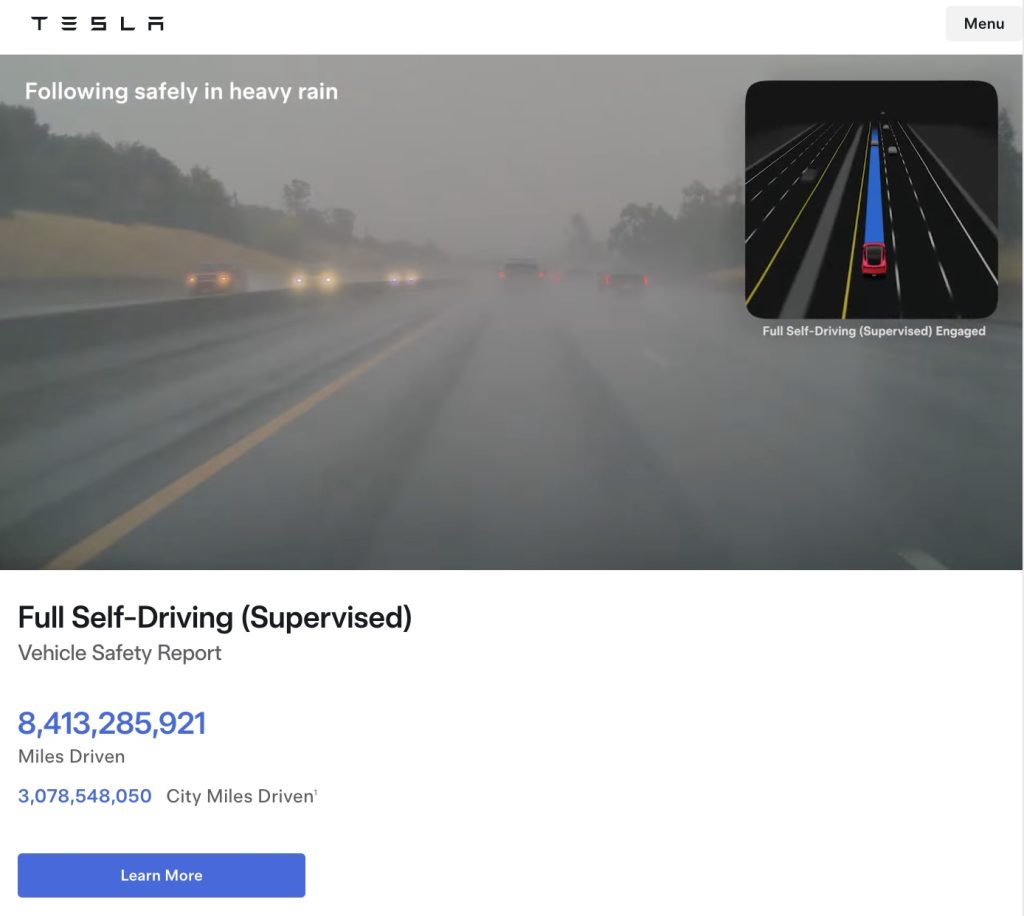
The milestone also brings Tesla closer to a benchmark previously outlined by CEO Elon Musk. Musk has stated that roughly 10 billion miles of training data may be needed to achieve safe unsupervised self-driving at scale, citing the “long tail” of rare but complex driving situations that must be learned through experience.
The growth curve of FSD Supervised’s cumulative miles over the past five years has been notable.
As noted in data shared by Tesla watcher Sawyer Merritt, annual FSD (Supervised) miles have increased from roughly 6 million in 2021 to 80 million in 2022, 670 million in 2023, 2.25 billion in 2024, and 4.25 billion in 2025. In just the first 50 days of 2026, Tesla owners logged another 1 billion miles.
At the current pace, the fleet is trending towards hitting about 10 billion FSD Supervised miles this year. The increase has been driven by Tesla’s growing vehicle fleet, periodic free trials, and expanding Robotaxi operations, among others.
With the fleet now past 8.4 billion cumulative miles, Tesla’s supervised system is approaching that threshold, even as regulatory approval for fully unsupervised deployment remains subject to further validation and oversight.
Elon Musk
Elon Musk fires back after Wikipedia co-founder claims neutrality and dubs Grokipedia “ridiculous”
Musk’s response to Wales’ comments, which were posted on social media platform X, was short and direct: “Famous last words.”
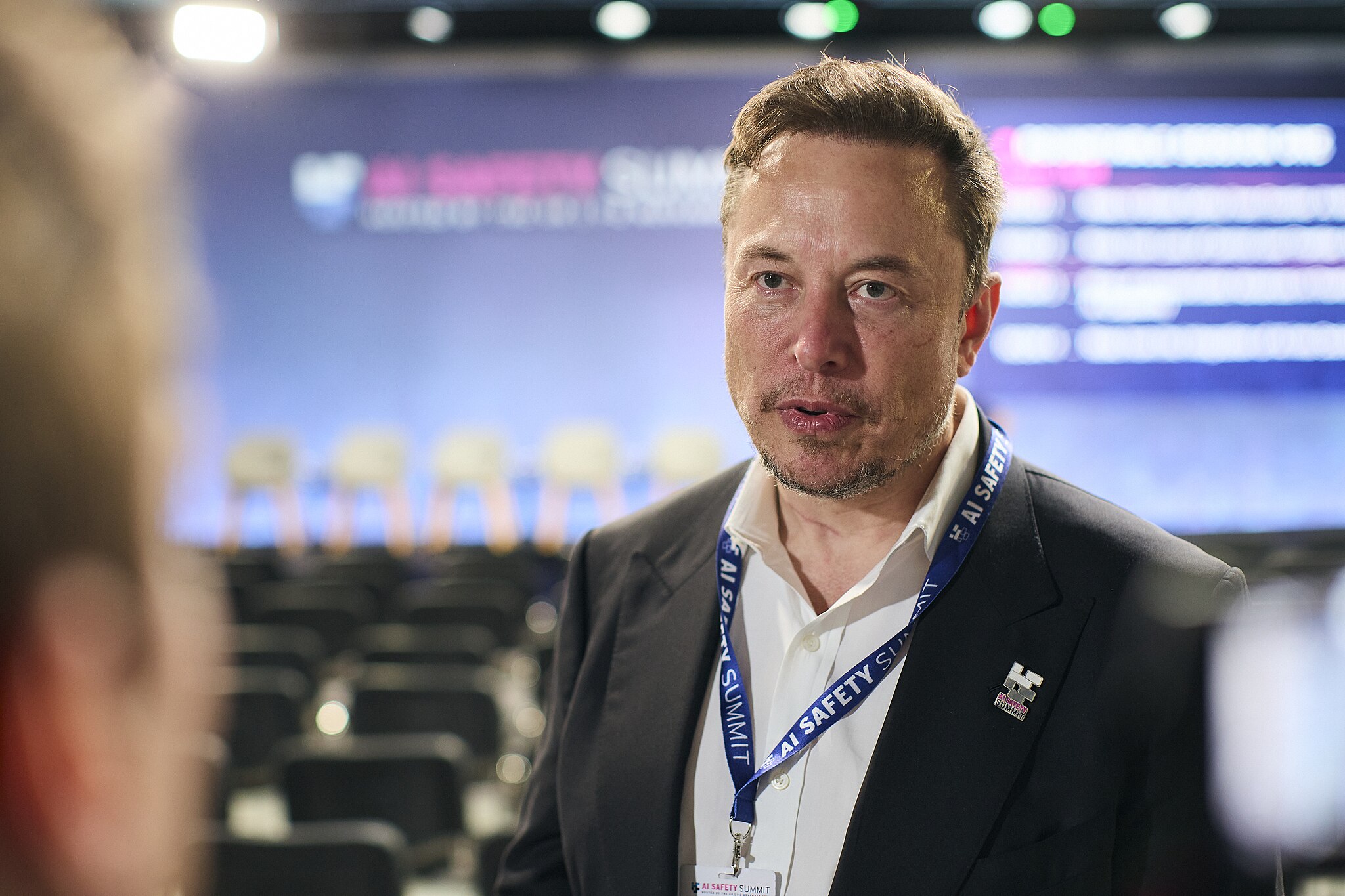
Elon Musk fired back at Wikipedia co-founder Jimmy Wales after the longtime online encyclopedia leader dismissed xAI’s new AI-powered alternative, Grokipedia, as a “ridiculous” idea that is bound to fail.
Musk’s response to Wales’ comments, which were posted on social media platform X, was short and direct: “Famous last words.”
Wales made the comments while answering questions about Wikipedia’s neutrality. According to Wales, Wikipedia prides itself on neutrality.
“One of our core values at Wikipedia is neutrality. A neutral point of view is non-negotiable. It’s in the community, unquestioned… The idea that we’ve become somehow ‘Wokepidea’ is just not true,” Wales said.
When asked about potential competition from Grokipedia, Wales downplayed the situation. “There is no competition. I don’t know if anyone uses Grokipedia. I think it is a ridiculous idea that will never work,” Wales wrote.
After Grokipedia went live, Larry Sanger, also a co-founder of Wikipedia, wrote on X that his initial impression of the AI-powered Wikipedia alternative was “very OK.”
“My initial impression, looking at my own article and poking around here and there, is that Grokipedia is very OK. The jury’s still out as to whether it’s actually better than Wikipedia. But at this point I would have to say ‘maybe!’” Sanger stated.
Musk responded to Sanger’s assessment by saying it was “accurate.” In a separate post, he added that even in its V0.1 form, Grokipedia was already better than Wikipedia.
During a past appearance on the Tucker Carlson Show, Sanger argued that Wikipedia has drifted from its original vision, citing concerns about how its “Reliable sources/Perennial sources” framework categorizes publications by perceived credibility. As per Sanger, Wikipedia’s “Reliable sources/Perennial sources” list leans heavily left, with conservative publications getting effectively blacklisted in favor of their more liberal counterparts.
As of writing, Grokipedia has reportedly surpassed 80% of English Wikipedia’s article count.
News
Tesla Sweden appeals after grid company refuses to restore existing Supercharger due to union strike
The charging site was previously functioning before it was temporarily disconnected in April last year for electrical safety reasons.
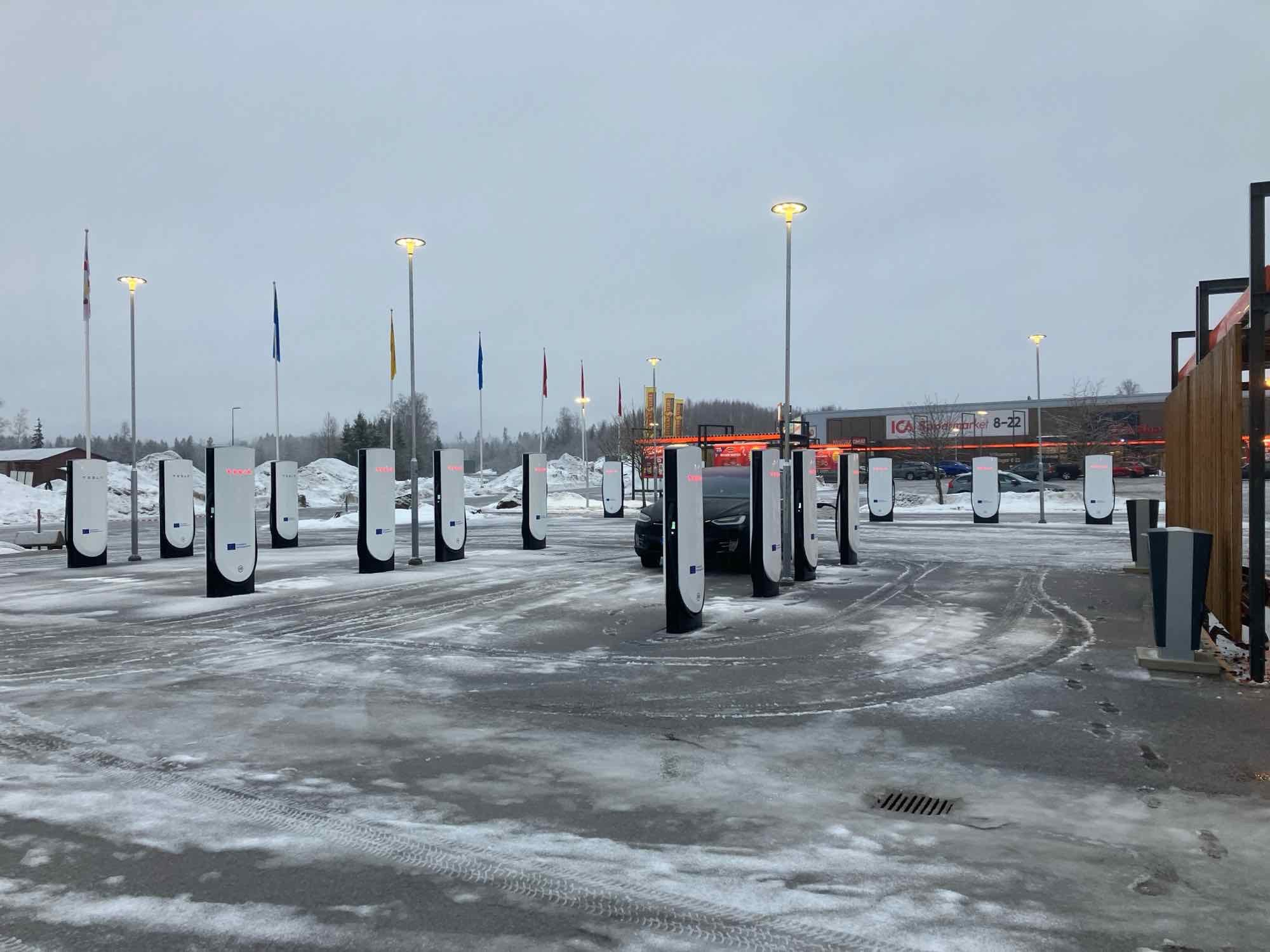
Tesla Sweden is seeking regulatory intervention after a Swedish power grid company refused to reconnect an already operational Supercharger station in Åre due to ongoing union sympathy actions.
The charging site was previously functioning before it was temporarily disconnected in April last year for electrical safety reasons. A temporary construction power cabinet supplying the station had fallen over, described by Tesla as occurring “under unclear circumstances.” The power was then cut at the request of Tesla’s installation contractor to allow safe repair work.
While the safety issue was resolved, the station has not been brought back online. Stefan Sedin, CEO of Jämtkraft elnät, told Dagens Arbete (DA) that power will not be restored to the existing Supercharger station as long as the electric vehicle maker’s union issues are ongoing.
“One of our installers noticed that the construction power had been backed up and was on the ground. We asked Tesla to fix the system, and their installation company in turn asked us to cut the power so that they could do the work safely.
“When everything was restored, the question arose: ‘Wait a minute, can we reconnect the station to the electricity grid? Or what does the notice actually say?’ We consulted with our employer organization, who were clear that as long as sympathy measures are in place, we cannot reconnect this facility,” Sedin said.
The union’s sympathy actions, which began in March 2024, apply to work involving “planning, preparation, new connections, grid expansion, service, maintenance and repairs” of Tesla’s charging infrastructure in Sweden.
Tesla Sweden has argued that reconnecting an existing facility is not equivalent to establishing a new grid connection. In a filing to the Swedish Energy Market Inspectorate, the company stated that reconnecting the installation “is therefore not covered by the sympathy measures and cannot therefore constitute a reason for not reconnecting the facility to the electricity grid.”
Sedin, for his part, noted that Tesla’s issue with the Supercharger is quite unique. And while Jämtkraft elnät itself has no issue with Tesla, its actions are based on the unions’ sympathy measures against the electric vehicle maker.
“This is absolutely the first time that I have been involved in matters relating to union conflicts or sympathy measures. That is why we have relied entirely on the assessment of our employer organization. This is not something that we have made any decisions about ourselves at all.
“It is not that Jämtkraft elnät has a conflict with Tesla, but our actions are based on these sympathy measures. Should it turn out that we have made an incorrect assessment, we will correct ourselves. It is no more difficult than that for us,” the executive said.








